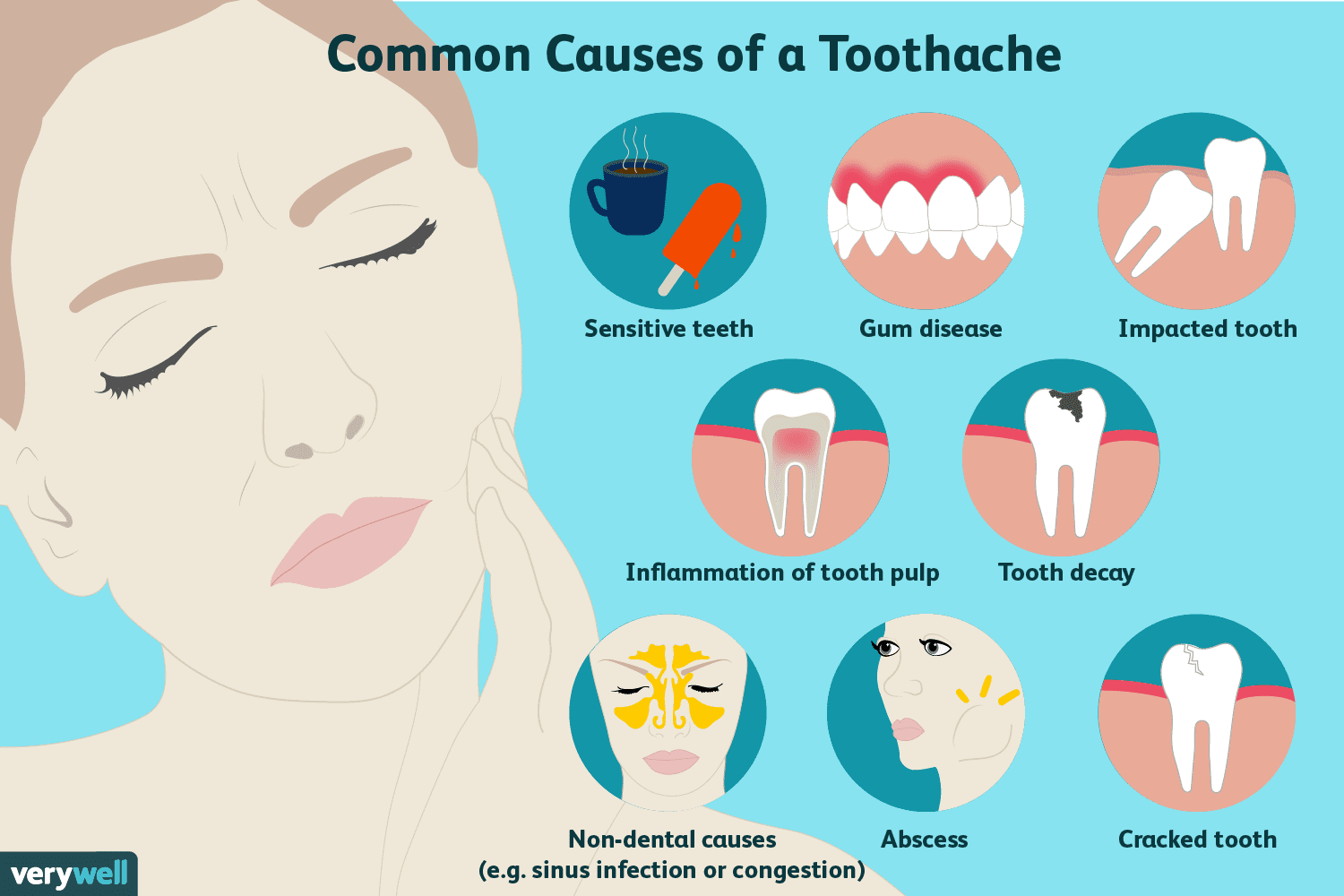Humans are provided with a nervous system that allows us to feel pain, including tooth pain. Experiencing tooth pain is not an unusual occasion. In fact, according to a report by the Australian Institute of Health and Welfare in 2019, Australia has an average of 12.8 decayed, missing, or filled teeth for people of age 15 and above.
What Causes Tooth Pain?
There are several factors that can cause tooth pain, including:
- Tooth decay: This is the condition where the tooth becomes eroded due to bacteria, forming holes and may even completely ruin your tooth. Tooth decay is painful as it destroys layers of the tooth and exposes the tooth’s nerves, making it more sensitive.
- Tooth abscess: Abscess, which is congested pus under the skin, can be formed anywhere in our body, including the mouth area. Tooth abscess occurs in the pulp of the tooth, and later could leak from the very bottom of the tooth.
- Cracked tooth: Your tooth can crack if it is forced to chew on something that is too hard. This can cause tooth pain, especially when eating, and needs to be repaired as soon as possible.
- Wisdom tooth: Emerging wisdom tooth that is misaligned would usually cause tooth and jaw pain.
- Gum disease: Gum disease is a bacterial infection that could affect the teeth as well. The bacteria build-up could easily cause tooth decay.
- Pulpitis (tooth pulp inflammation): Tooth pulp is located in the centre of the tooth and it is a soft area that contains nerves, blood vessels, and tissues. The swelling of the pulp creates pressure towards the outer parts of the tooth, making the entire tooth ache.
- Other illnesses: Tooth pain could also be caused by non-dental illnesses, such as sinusitis (sinus infection). Sinusitis can cause tooth pain because the sinus cavities are located just above the upper teeth. Especially when you bend over, the pressure from your sinus can get ‘transferred’ to your teeth.

What Are the Signs of Tooth Pain?
The most obvious symptom of tooth pain is experiencing aching tooth and/or jaw. Especially when it is caused by tooth decay, pulpitis, or cracked tooth, you could feel a stinging sensation when chewing. Thus, eating could become quite a challenge.
Another sign that you may experience is the increased level of sensitivity of your mouth area, which can be felt when eating hot or cold food. Additionally, this shows that your tooth pain is likely to be caused by gum disease.
Other symptoms of tooth pain include bleeding tooth or gums, swelling of gums, and swelling of the jaw.
What Are the Risks and Possible Complications of Tooth Pain?
Tooth loss is one of the most common results of tooth pain, and it is worth noting that teeth extraction is not the most severe consequence of ignoring your tooth pain. Tooth pain should not be taken lightly as it could develop into a bigger, more serious condition, including:
- Ludwig’s angina: A skin infection that affects the floor of the mouth caused by tooth abscess. This condition is considered rare, although it could be a risk of neglecting your tooth pain.
- Pulmonary actinomycosis: Similar to Ludwig’s Angina, this is a rare infection caused by tooth abscess as well. Untreated tooth abscess could spread to the lungs and cause infections.
- Other bacterial infections: Besides the two diseases previously mentioned, there are still many more types of bacterial infections that could occur due to untreated tooth pain, primarily because of tooth abscess. The untreated abscess from the mouth could easily spread to different parts of the body, including lungs and even brain.
What Are the Treatments Available to Cure Tooth Pain?
There are a number of options to cure tooth pain depending on what had caused it in the first place. Your dentist will examine your mouth, find the source of pain, and determine the best treatment to cure it. For instance, impacted wisdom tooth that causes tooth pain will be extracted, while pain caused by tooth decay could be treated by installing a dental crown to support the damaged tooth.
Therefore, having a dental checkup is crucial. Do not neglect the pain (even if it is bearable) because there is a great chance that your tooth pain is a signal of another condition that needs to be treated immediately.
How to Avoid Tooth Pain?
Most of the causes of tooth pain happen due to the lack of oral hygiene, and therefore, brushing your teeth twice a day and flossing regularly will keep your teeth and gums healthy. Moreover, being more careful when chewing food could also help. Forcing your teeth to munch on something that is too hard could hurt your tooth and jaw.
F.A.Q's on Tooth Pain
Can tooth pain go away without getting a treatment?
No, it is highly unlikely for a tooth pain to go away on its own. Especially since tooth pain itself is caused by another dental illness, it is best to see the dentist to have it properly checked.
Is there a way to treat tooth pain at home before having a dental examination?
There are several options that you can try to relieve the pain, although these will not cure the major cause of it. Some of the options include gargling mouth with warm salt water and calm the inflammation using ice or cold compress.
What are the fastest ways to relieve tooth pain?
Taking painkillers, using numbing gel, gargling warm salt water, and consuming fruits and vegetables that contain antibacterial properties are some of the ways to relieve tooth pain. However, please keep in mind that these options lift the pain for a temporary amount of time only.
Can painkillers cure tooth pain?
Painkillers can only temporarily relieve the pain but it will not cure the main cause of it. Visit the dentist to determine and treat the source of the pain.
Is it safe to use numbing gel on tooth pain?
Yes, numbing gel can be used to ease the pain. However, numbing gel is designed for temporary use only.
How can warm salt water treat tooth pain?
Salt is able to drain liquid that causes swelling. Gargling warm can reduce the swelling caused by tooth pain, although it will not completely cure it.
Are there any certain types of food that can cure tooth pain?
There a number of fruits and vegetables that could ease tooth pain, including cloves, garlic, turmeric powder or paste, guava leaves, and cayenne pepper. These natural ingredients contain anti-inflammatory and antibacterial properties that could reduce the pain and inflammation of tooth pain.
Brushing teeth has become painful due to my tooth pain. Any suggestions?
Yes, brushing your teeth is essential, especially when you have tooth pain because it will eliminate the bacteria in your mouth. Brush gently and use a soft-bristled toothbrush so that it will not hurt as bad.
Does tooth pain become worse at night?
Tooth pain does not worsen at night but it certainly could feel more painful when you are sleeping or lying down.
I have trouble sleeping because of tooth pain. Any suggestions?
The blood flows to your head when you lie down, adding pressure to your mouth area. A way to avoid this is by elevating your head a bit when sleeping, and you can also use an ice or cold compress before or while you are sleeping.
Is tooth pain considered a dental emergency?
Some tooth pain can be considered a dental emergency. If the pain is really severe, your gums are bleeding, or your tooth is broken, you are more than welcome to go directly to the emergency room.
My gums are swelling but I do not feel any pain at all. Should I be concerned?
This could be a sign that you have gum disease as the symptoms are often painless. Go for a dental checkup to make sure.
Is age a factor that causes tooth pain?
Anyone, from kids to elders, is prone to tooth pain. However, the chances of getting gum recession increase as we grow older, making the teeth more sensitive and vulnerable to all sorts of dental problems.
Can kids get tooth pain?
Yes, it is possible for kids to have tooth pain. Additionally, it is important to teach them about oral hygiene and make it a habit to prevent them from getting dental problems.
Is tooth pain a symptom of oral cancer?
Tooth and jaw pain are the early signs of cancer. With that said, however, not every tooth pain is a symptom of oral cancer, and there are also many other risk factors of tooth pain other than oral cancer. Visit your dentist for a checkup to make sure.
How long does it take to recover from tooth pain?
Depends on the severity of the tooth pain and the treatment you went through. Some may heal in several days, while more serious cases take months to recover.
What should I do after getting my tooth pain treated?
Be sure to always maintain good oral hygiene. Brushing your teeth twice a day and flossing regularly will keep your teeth clean and healthy.
How often should I visit the dentist after getting my tooth pain treated?
Depending on the treatment given, the dentist will give you further instructions. Regular dental checkups, however, should be done at least once every six months.






